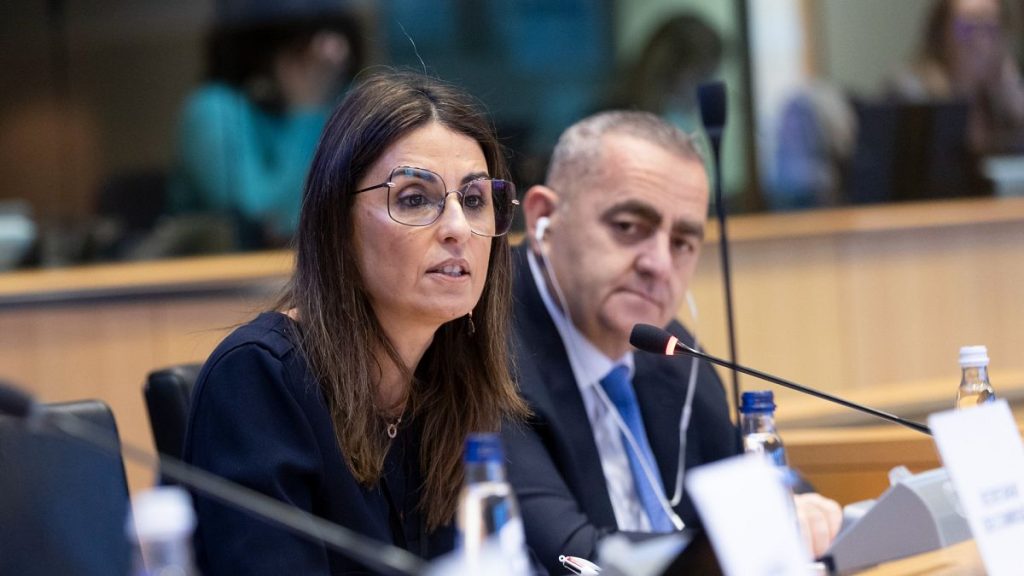Teresa Anjinho, a seasoned human rights lawyer and former deputy ombudsman of Portugal, has ascended to the prestigious position of European Union Ombudsman, garnering substantial support from Members of the European Parliament (MEPs). This victory marks a significant milestone in her career, positioning her as the successor to Emily O’Reilly, who served in the role for over a decade. Anjinho’s election follows a competitive process, where she successfully navigated a field of five other candidates, ultimately securing the necessary votes to assume this crucial responsibility. Her mandate will involve investigating instances of maladministration within EU institutions, ensuring transparency and accountability within the complex machinery of the European bureaucracy.
Anjinho’s journey to this esteemed office began with her nomination in September, receiving overwhelming backing from Portuguese MEPs. This strong initial support signaled her ability to bridge political divides, a critical skill for navigating the diverse landscape of the European Parliament. During her campaign, Anjinho emphasized her commitment to upholding the highest standards of transparency, ethics, and citizen rights. She articulated a vision of an EU administration that prioritizes fairness, integrity, and trust, fostering a stronger bond between institutions and the citizens they serve. This message resonated with MEPs, who ultimately entrusted her with the responsibility of safeguarding the principles of good administration within the EU.
The election process culminated in two rounds of voting, where Anjinho secured an absolute majority, obviating the need for a third and final round. Her victory is attributed, in part, to the support she received from the European People’s Party (EPP), the largest political group in the European Parliament. This affiliation, stemming from her previous role as a national lawmaker and a brief stint as justice minister, provided a solid base of support. However, Anjinho was also careful to emphasize her independence and impartiality, highlighting her background in academia and as deputy ombudsman. This reassurance was crucial, addressing potential concerns about political bias, particularly given the possibility of investigating individuals from her own political affiliations, including high-ranking officials like Commission President Ursula von der Leyen.
Anjinho inherits the mantle from Emily O’Reilly, whose tenure as EU Ombudsman was marked by a proactive and impactful approach. O’Reilly, a former journalist and ombudsman for Ireland, was known for her willingness to tackle controversial issues, earning her widespread respect within the European Parliament. Her notable cases included investigations into alleged undisclosed vaccine contract negotiations between President von der Leyen and the CEO of Pfizer, and scrutiny of the appointment of Martin Selmayr as Commission Secretary General. These high-profile interventions demonstrated O’Reilly’s commitment to holding powerful figures accountable and ensuring transparency in EU decision-making.
However, O’Reilly’s work extended beyond the realm of high politics. She emphasized the importance of addressing even seemingly small injustices, demonstrating a genuine concern for individuals impacted by bureaucratic hurdles. One of her most cherished cases involved securing a parliamentary pass for a contractor’s baby, enabling the mother to continue her work as an interpreter while breastfeeding. This anecdote highlights O’Reilly’s belief that the role of ombudsman is not solely about enforcing regulations, but also about advocating for fairness and human dignity in all circumstances.
Teresa Anjinho, while a trained lawyer, has expressed a similar commitment to prioritizing the human element of her work. She recognizes that complaints often stem from a sense of unfairness, even when the strict letter of the law has been followed. Anjinho understands that the law is not always synonymous with fairness, and that her role is to bridge that gap, ensuring that EU citizens are treated with respect and dignity, regardless of the complexities of legal frameworks. This approach echoes O’Reilly’s legacy and suggests a continuation of the Ombudsman’s role as a champion for citizens navigating the often-daunting landscape of EU bureaucracy.
Anjinho steps into this role with a clear understanding of the challenges and opportunities that lie ahead. She recognizes the importance of maintaining the Ombudsman’s independence and impartiality, ensuring that the office remains a trusted resource for citizens seeking redress against maladministration. Her background as a human rights lawyer and deputy ombudsman, combined with her political experience, equips her with the necessary skills and perspective to navigate the complexities of the EU system. Her commitment to transparency, ethics, and citizen rights provides a strong foundation for her work, promising a continuation of the Ombudsman’s crucial role in holding EU institutions accountable and ensuring fairness in the application of EU law. Anjinho’s tenure will undoubtedly be closely watched, as she navigates the challenges and opportunities inherent in this vital role, striving to uphold the principles of good administration and build trust between EU citizens and the institutions that serve them. Her success will depend on her ability to navigate the political landscape while maintaining an unwavering commitment to the principles of fairness, transparency, and accountability. The European Parliament, and indeed all EU citizens, will be looking to her to uphold the high standards set by her predecessor and to further strengthen the Ombudsman’s role as a vital safeguard against maladministration within the EU.










